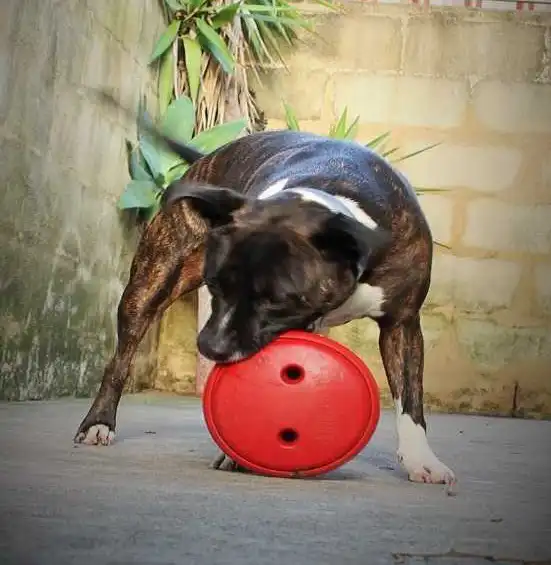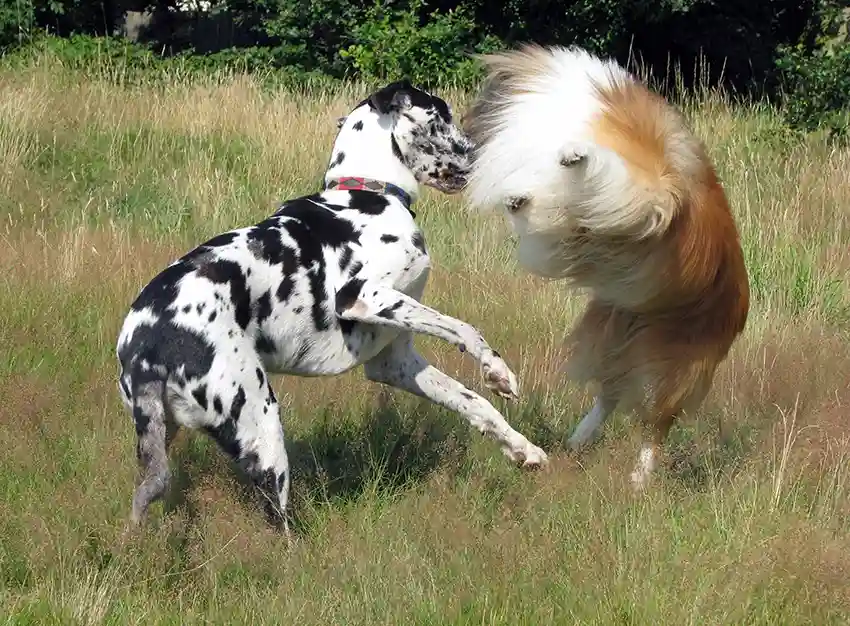Better known as the "Lassie Dog", the Rough Collie swept into popularity on the back of the Lassie book, TV, and movie franchise. Also known as the Scottish Collie, the Rough Collie is a friendly breed with their striking appearance, marked by luxurious coats and almond-shaped eyes, that's in keeping with their proud heritage as sheepdogs in Scotland and Wales. Rough Collies have since been bred for domestication and make wonderful companion dogs.
Rough Collie Training
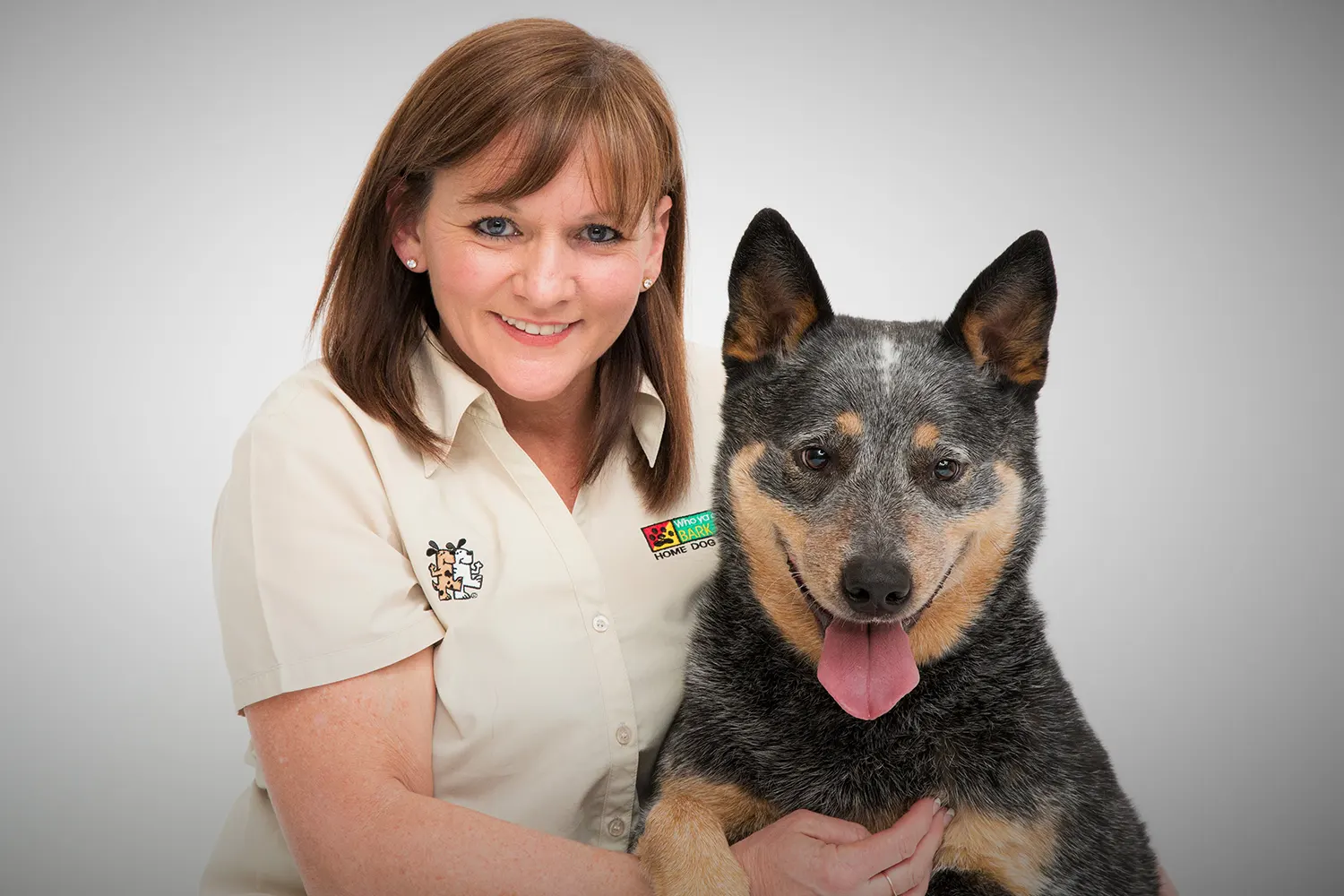
Donna Ryan - Bark Busters International Head of Training
I'm probably showing my age, but when I think of the Rough Collie, I think of Lassie. Maybe it's because everyone I knew who owned one named theirs after the star of the show! Rough Collies are intelligent, friendly dogs that were originally bred to herd sheep. They make great family pets, but are still considered working dogs, which means they need space to run, and maybe aren't the best choice for flats and apartment dwellers. Their abundance of energy means they will happily join their owners for long hikes, runs, or other activities. However, it can also lead to behaviour problems if not properly channelled through consistent Rough Collie Training.
Rough Collies Training Case study
Clarence the Rough Collie. Clarence lived to herd the cats, the children (easier than the cats!), and the adults, nipping at their heels to round them up. In fact, Clarence would only stop herding once he got everyone in the same room. He was most relaxed when the family would sit down at the table for meals because he knew exactly where everyone was.
Clarence was extremely smart, so whenever Mum or Dad went to the kitchen, Clarence would try to round up the entire family into the dining room. If the kids were in their rooms with the doors closed, which was often the case because of his nipping behaviour, he would either bark outside the door or scratch until they opened it. Doing so out of annoyance only reinforced the behaviour. Clarence thought he had done his job!
Once everyone was properly herded into one room, Clarence would settle down to watch them. If anyone looked like they were going to leave, he would spring into action, blocking or barking at them. It didn't take long for the family to grow tired of this behaviour.
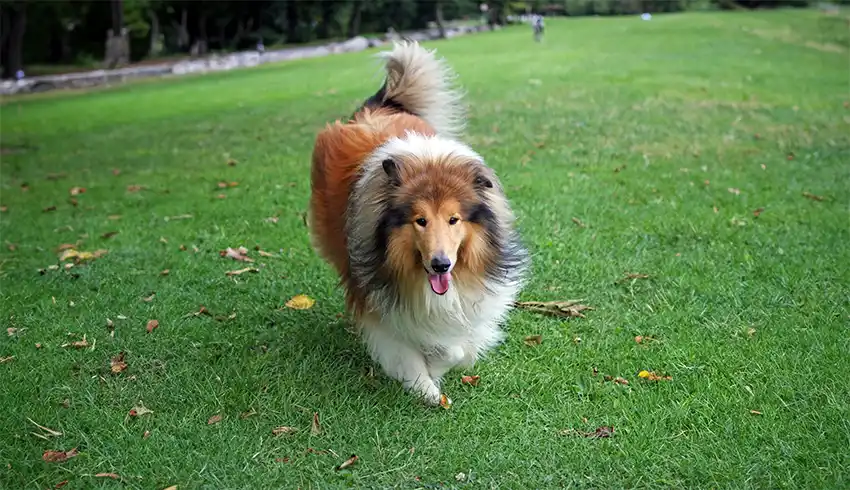
After learning and observing the interactions between the family and Clarence, we developed a plan to help everyone live in harmony using the Bark Busters communication techniques and behaviour concepts that are natural to dogs. We taught the family how to 'speak dog', explained leadership concepts, and showed them exercises to work on with Clarence to reinforce that they were the decision makers and leaders, and not him. This kind of consistent approach is a cornerstone of effective Rough Collie Training.
It was important to the family to give Clarence an outlet for his herding instinct, so we developed an activity using their fenced backyard. One person would kick footballs around the yard and Clarence would herd them into a marked area. He was a natural! By executing this plan consistently, a hallmark of any dog training technique, we were able to quickly change Clarence's behaviour. Clarence was happy, and the family no longer had to worry about having their heels nipped. These exercises are an excellent example of practical Rough Collie Training in action.
Rough Collies are wonderful dogs for families and people living active lifestyles, but their energy and herding instinct can lead to some rough edges. If you have a Rough Collie with some rough spots, contact your local Bark Busters trainer. They can help smooth them out through proven Rough Collie Training methods so, like Clarence, you can have a great relationship built on mutual understanding, trust, respect, and love.
Physical Characteristics
The Rough Collie (Scottish Collie) is easily recognisable, defined by its angular head, long, elongated muzzle, almond-shaped eyes, and a lush coat.
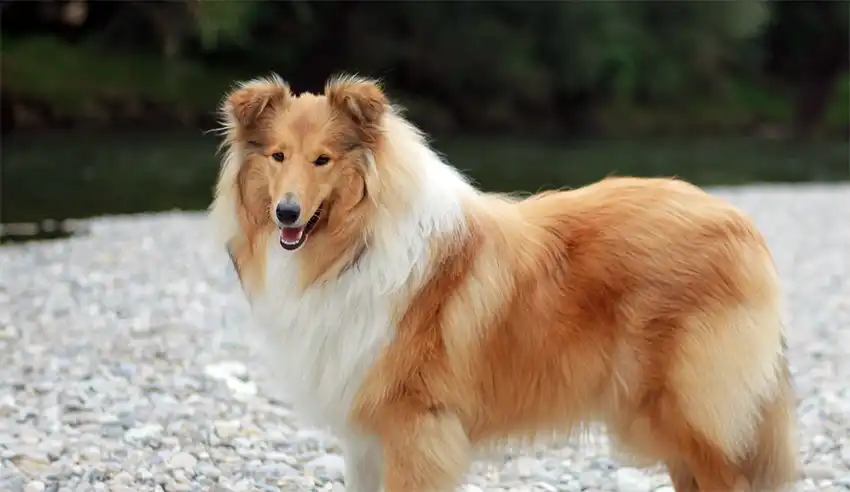
History
Originating in the Scottish Highlands in the 18th century, Rough Collies (and their Smooth Collie cousins), were bred with great care by farmers and shepherds to possess ideal traits for herding and guarding hardheaded flocks of sheep. They were smaller than the dogs we see today and were thought to be mainly black and white or black and tan. They were bred with a mix of fearlessness, aggression, determination, strength, speed, intelligence and a coat to withstand all weathers.
Rough Collies quickly became the prevailing sheepherding breed in Scotland and Wales, maintaining that status through the 1800s. Welsh varieties, traditionally a smaller, friendly, more nimble-type dog, were crossbred with English sheepdogs to produce long- and short-haired Rough Collies.
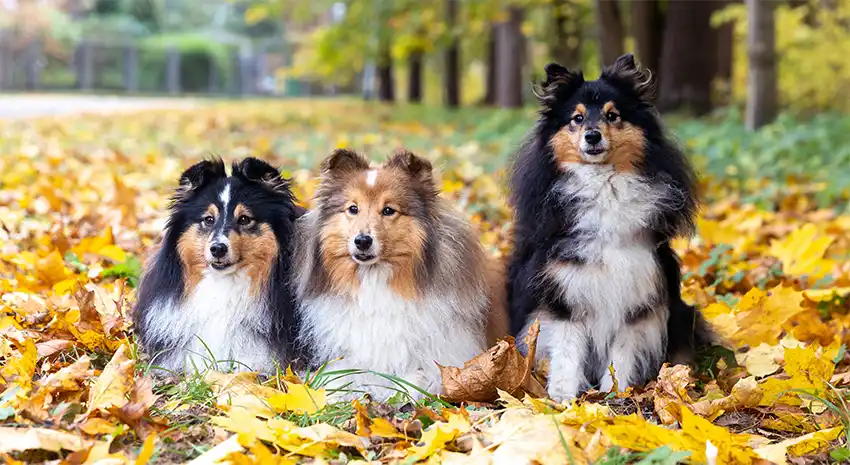
As dog ownership became fashionable during the Industrial Revolution, people began keeping Collies as pets. Rough Collies quickly became popular show dogs, debuting in 1860 at the Birmingham, England dog show as "Scotch Sheepdogs". Modern day Rough Collies are a softer-natured dog and are better suited for companionship and pet ownership than its predecessors.
Personality and Temperament
Modern Rough Collies possess a sweet, appealing personality and keen intelligence. They are generally very loving, loyal and trustworthy. Like any breed, there are instances of very timid temperaments and aggression, but these tend to be rare. If introduced correctly and given proper training, they are friendly with other dogs and great with children.
Grooming
Rough Collies have a luxurious double coat that requires regular attention, which also makes for a great bonding time too. It is recommended to brush their coats once a week to maintain fur and skin health, with extra brushing around the shedding times.
Puppy Selection
It is always better to get the right temperament puppy for your family, over picking one based on colour or gender. A pretty face will not matter much if you and your puppy do not get along and does not fit in well with your family's lifestyle.
It is important that you don't remove a puppy from their mother litter before 8 weeks, but 12 weeks would be even better. The time they spend with their mother and siblings is critical to their development. Puppies removed too early tend to be nervous, bark a lot, and bite because appropriate behaviour is learned at their mother's teat. Many long-term behaviour problems can be attributed to a puppy being removed from the litter much too soon.
Socialisation is learned with their littermates, and one that should be ongoing too. Although they are social creatures and generally get along with both people and other dogs, there are always exceptions to the rules. It is important to introduce your dog to new experiences and people, but it must be done carefully and without fear. Never take your dog into fearful situations because traumatic experiences can result in lifelong anxieties.
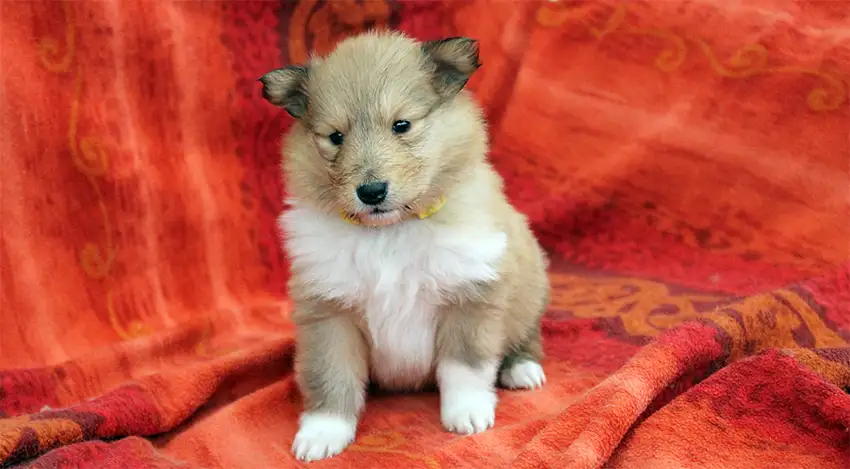
Introduce your puppy carefully to other dogs that you know could serve as a good role model. Dogs learn a lot from other dogs. Just like you don't want your kids hanging out with bad influences, the same rule should apply to dogs too.
Always choose a reputable breeder and ask for references. Rough Collies can often cost a pretty penny. That's why we suggest looking at rescue centres, animal welfare shelters or the RSPCA. These dogs are tested for temperament and soundness before being put up for adoption.
If you're out of luck at the rescue centres, then ensure you choose a reputable breeder. Check out the Kennel Club for a list of approved breeders close to you.
Many dogs are abandoned for the wrong reasons and some people are not fully prepared to do what it takes to train and educate a dog. All shelters give their dogs health checks to make sure they are in good shape and up to date on their vaccinations and will make you aware of any behaviour problems too. Bark Busters trainers work with many local shelters to help overcome any behaviour problems before a dog is adopted.
A good breeder will, where possible, try and screen out all the health problems inherent to the breed. They should be happy to answer your questions about temperament and health considerations and should ask you questions about your lifestyle and goals. Reputable breeders are registered, and they abide by certain policies and screening.
Before you decide on a puppy, ask yourself if you would be better off with an adult Collie, that would mean lower maintenance and lower energy. Puppies are fun, but they are also a lot of work.
Whether you decide on a puppy or an adult make sure you take your dog to the vet soon after adoption to identify and prevent any problems and to check on its immunisation and desexing needs.
Four Basic Needs
Let's examine those four basic needs and why your dog needs them to keep it healthy, balanced and content.
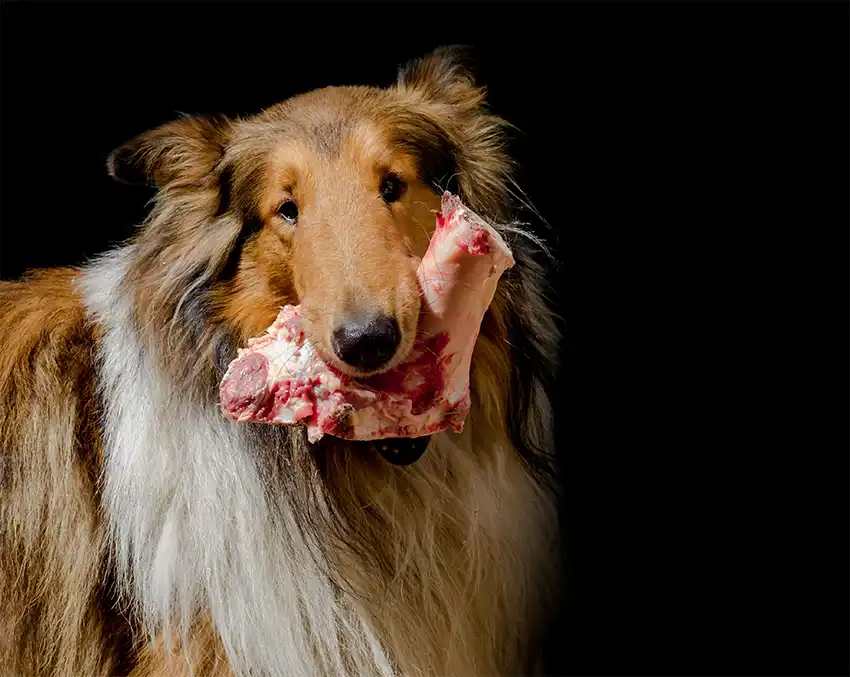
Food - diet / nutrition
Some dogs can be pretty picky about their food. Consult with your veterinarian about which brand of food you should purchase, or which raw diet is best for your dog. Your dog's diet is important to meet their nutritional needs and to maintain the overall health. For puppies, as they are so small, you don't need a lot of food to fill them up!
We promote a diet that is grain free, low in carbohydrates and without any harmful e-numbers, colours and preservatives. Carbohydrates do add energy that the dog needs to burn off and can make an already hyperactive dog more active.
The right diet, grain free and filled with fruits, vegetables and raw meat will have advantages to how your dog will feel, look and act.
If you want to understand why grains can make a dog more energetic, you only need to think of racehorses and how their trainers give them grain to get highly energetic racehorses. Energy in, equals energy out.
Bark Busters dog trainers are not vets or dietitians, so we urge you to do your own research into the best diet for your dog. A diet that you will be comfortable with.
We do however have vast experience of how highly concentrated grain diets effect behaviour and can cause hyperactivity. This is very prominent in Japan, where most dogs are fed high levels of rice in their diet which can adversely affect concentration and focus.
Safety - through leadership and education
All dogs need strong leadership and to know where they fit into the family unit. If they know they have a leader that will make all the decisions, one who is fair and just, they will be happy and content.
On the other hand, if they have no structure in their life, they have inconsistency, and don’t know how things will be from one day to the next, then they will become stressed and may experience health ailments, skin and stomach issues and behaviour problems. Routine and respect must be established. With equal doses of love and structure your dog will feel safe and secure.
Your dog just wants to please you but many times they don't know how. If you don't quickly establish yourself as the leader, your dog will gladly assume this role and chaos could follow.
Shelter - a place to call their own
Dogs love nothing better than to curl up on the couch or in a place they can call their own, even when there is more than one dog. Most dogs are very sociable, and they will think nothing of all snuggling in together. Provide your dog with its own "den", a place where they can call home, and somewhere they can go to for a bit of peace and quiet. Just make sure their "den" is warm, easy to clean and maintain. Also, this breed does not like to be cold, and their shivering is a sign that some warmth is needed.
Entertainment - toys and games
A very important part of your dog's four basic needs is their need to have something to do. If we want to avoid our pets becoming bored and destructive, then they need a way to fill their day.
Dogs thrive with physical and mental exercise. Dogs are highly intelligent animals, and they need to keep their brains active as much as their bodies. Entertainment is an important part of their well-being and essential to your dog's overall mental health.
One great toy is the Bark Busters GameChanger® which helps to prevent boredom, stress, and separation anxiety. By filling it with small treats, your dog will have plenty of fun trying to get the treats to dispense.
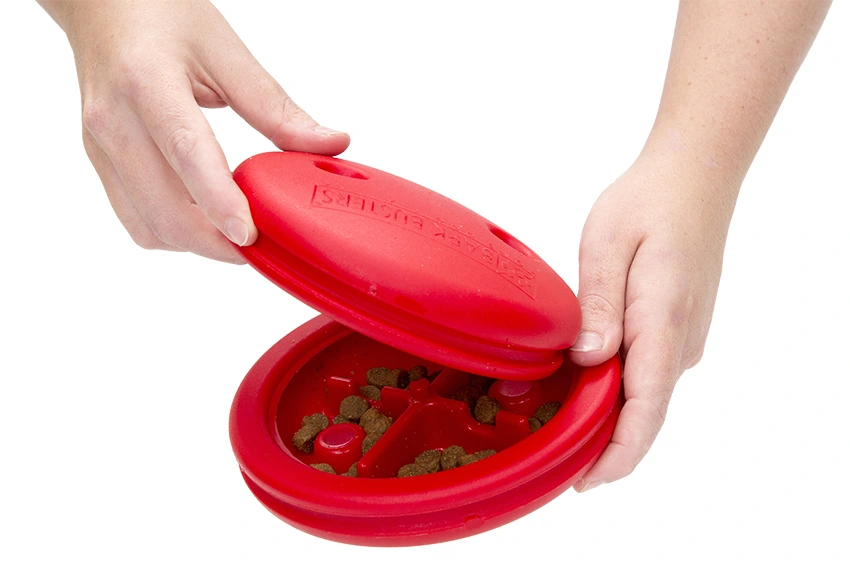
Games to Play
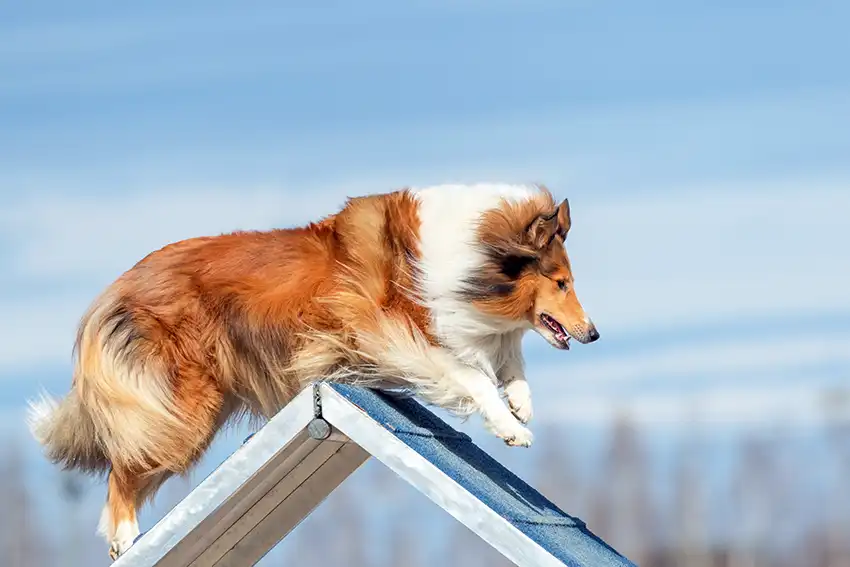
What are the right games, you might ask?
Don't play any games that involves rough and tumble as this only encourages biting. 'Tug of War' is okay and playing ball is good, provided your dog is not the type that gets fixated on the ball and refuses to stop playing when requested.
Hide and seek -
Is a great game too. These are games where you hide things from your dog, like toys or a tennis ball or treats and then encourage them to find them. You can increase the degree of difficulty as your dog gets better at the game. Start out where your dog sees you hide the item, then repeat over and over, 'Seek' which is a good command to use for this exercise. Remember to give a lot of praise when they find it. These types of games are more calming for your Yorkie, than those type of games that encourage your dog to become over-excited or teaches them to bark or bite hands.
Fetch -
Rough Collies are great sports and love to chase balls and play with toys. Your dog will love a rousing game of fetch, challenge yourself to see how far you can throw it. Also teach the command of "out" once you dog has brought the object back to you.
Walking -
This classic form of exercise is still great for all breeds, but make sure you don’t overwork your dog, especially in hot weather.
Child’s Play
All dogs need to be controlled around babies or toddlers so as not to nip at them. They are intelligent and do learn quickly, so spend time educating them as to what is good and what is not. If you are patient and understanding of their capabilities, you will be able to enjoy many great times as a family with your dog.
Dog Parks
Taking Your Rough Collie to Dog Parks
Dog Parks are one of the most misunderstood dog activities of the modern-day dog world. Some doggie parents love nothing more than to take their dog to a dog park. They have been told they need to socialise their dog and so off they go.
They love the fact that their dog has fun, they get to meet other dog lovers and watch the dog's romp around and play.
That is the upside, but the downside is there are those dog lovers whose dogs don't fit into this world at all. They are those dogs or puppies that were bullied, frightened on their first visit or whose personality does not fit the mould.
These folks agonise over the fact that their dog or puppy does not look forward to its trip there, it hides under the seat of the car, or it has to be carried or enticed into the park.
Many ask us why their dog acts like this and how they can fix it?
Bark Busters do have ways to assist these pet parents, but we do also explain why their dog might not like the dog park because of its personality.
It reminds us of a friend of ours who visited us regularly with her little dog, 'Harry'.
When they would arrive, Harry would walk up to each of us, sniff our legs and walk away.
She questioned us one day on why we never petted Harry when he came up to us.
We explained that this was not what Harry was doing, he was sniffing us, not requesting a pat. If he had been requesting to be petted, after sniffing us, he would have gestured to us to pet him. He did not do that, instead he walked away.
We told her that Harry was not a social dog and preferred not to be touched by anyone other than her and he avoided any interaction with our dogs too. He was a 'one person' dog that did not feel comfortable around others.
It was like a light had been turned on, our friend smiled and told us that this explained a lot to her. She further explained that every time she took Harry to the dog park, that he could not wait to get back to the car when it was time to leave, that he would stand away from the other dogs, never join in the play and snap at other dogs when they came near him.
He was telling her in every way he could that he did not fit into that dog park crowd, just like some humans hate parties!
Bark Busters Lifetime Support Guarantee
Bark Busters dog behaviour therapists and trainers have trained more than 1 Million dogs worldwide and are renowned authorities in addressing dog behaviour with all-natural, dog-friendly methods. The Bark Busters training is the only service of its kind to provide International dog training guaranteed lifetime support. With hundreds of trainers around the world, Bark Busters continues its mission to enhance the human/canine relationship and to reduce the possibility of maltreatment, abandonment and euthanasia. Contact your local Bark Busters dog trainer to see how they can help.
This article is the copyright of Bark Busters® and is intended for information purposes only. Dog owners should fully research any problems that they may have with their dogs.

